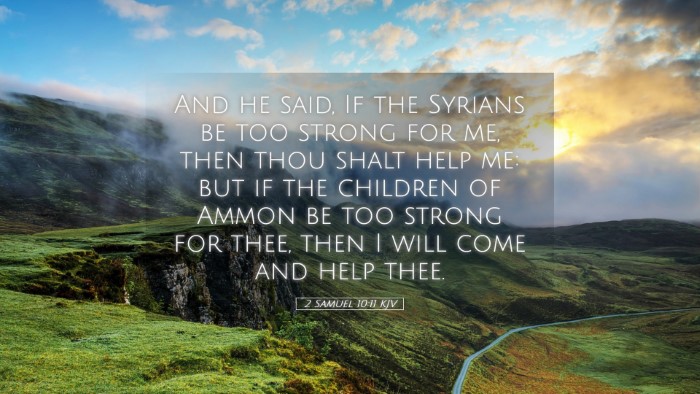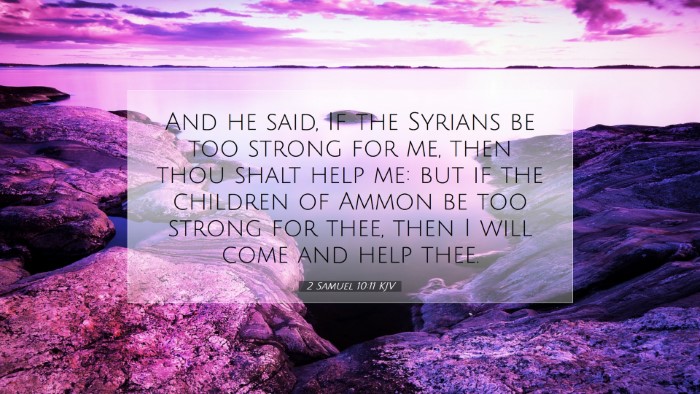Old Testament
Genesis Exodus Leviticus Numbers Deuteronomy Joshua Judges Ruth 1 Samuel 2 Samuel 1 Kings 2 Kings 1 Chronicles 2 Chronicles Ezra Nehemiah Esther Job Psalms Proverbs Ecclesiastes Song of Solomon Isaiah Jeremiah Lamentations Ezekiel Daniel Hosea Joel Amos Obadiah Jonah Micah Nahum Habakkuk Zephaniah Haggai Zechariah Malachi2 Samuel 10:11
2 Samuel 10:11 KJV
And he said, If the Syrians be too strong for me, then thou shalt help me: but if the children of Ammon be too strong for thee, then I will come and help thee.
2 Samuel 10:11 Bible Commentary
Commentary on 2 Samuel 10:11
2 Samuel 10:11 states: “And he said, 'If the Arameans are too strong for me, then you shall help me; but if the Ammonites are too strong for you, then I will help you.'” This verse is rich with implications regarding warfare, alliance, and faith in God's guidance. Below, we summarize insights from several public domain commentaries to provide a thorough exploration of its meaning.
Contextual Background
The background of this verse is essential for understanding its implications. David is engaged in military conflict against the Ammonites, who had insulted his messengers. In this strategic situation, the character of Joab, the commander of David's forces, is highlighted. The engagement is not merely physical; it also speaks to the alliances and strategies involved in ancient Near Eastern warfare.
The Significance of the Alliance
Matthew Henry comments on the significance of the alliance between Joab and his brother Abishai. This strategic partnership illustrates the necessity of cooperation in battle, where each leader understands that the success of their mission relies on mutual support. The verse reflects a vital aspect of military leadership—recognizing one’s strengths while being aware of vulnerabilities.
Albert Barnes expands on this by suggesting that Joab’s statement emphasizes the importance of seeking assistance in times of struggle. “If the Arameans are too strong for me,” suggests awareness of his limitations. Such humility is vital in ministry and leadership where reliance on others, especially in moments of weakness, is essential.
The Theological Implications
On a theological level, Adam Clarke points out that this verse underlines God's providential care even in military matters. The underlying faith in God’s sovereignty is echoed in the need for both brothers—ultimately seeking God’s help through one another. The recognition of human limitations becomes a pathway to divine assistance. Clarke emphasizes that the strength of a leader is not merely in personal might but in the unity and collective strength found in Godly alliances.
Spiritual Warfare
This historical battle serves as an analogy for the spiritual battles faced by believers. The commentary suggests that just as Joab called for unity in the face of military opposition, Christians are called to support one another in their spiritual struggles. Mutual dependence, as highlighted here, reflects the body of Christ as described in 1 Corinthians 12:12-27.
The Roles and Responsibilities of Leaders
In addition to the alliances made, this verse also reveals the responsibilities taken on by leaders. Joab displays a sense of accountability, ready to fulfill his duty in battle alongside his brother. This aspect of leadership is paramount, as it speaks to the pastoral role in mentoring and supporting fellow leaders within the church context.
Application for Pastors and Theologians
For pastors and theologians, this passage provides various applications:
- Collaboration: Encouragement of collaborative efforts among church leaders can enhance the strength and outreach of the ministry.
- Vulnerability: Acknowledging limits in personal abilities while actively seeking support illustrates humility and reliance on others within congregational contexts.
- Prayer and Dependence on God: Just as Joab hinted at the necessity for divine help, pastors are reminded of the importance of prayer in seeking God’s guidance and strength in ministry.
- Understanding Warfare: Recognizing spiritual warfare and the need for readiness and support from fellow believers is critical for effective ministry.
Conclusion
In summary, 2 Samuel 10:11 encapsulates profound truths about leadership, cooperation, and reliance on God within both military and spiritual realms. Lessons from Joab and Abishai can encourage contemporary leaders in the church to cultivate unity and collaborative ministry. By examining the dynamics of this verse, ministers and scholars can gain vital insights necessary for effective leadership and nurturing the body of Christ.


